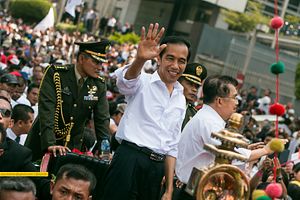Indonesia is no stranger to political dynasties. Since independence in 1945, Indonesia has repeatedly seen the children of past presidents seek positions in public office. Unsurprisingly, Indonesia’s incumbent President Joko “Jokowi” Widodo is now attempting to follow suit, with his son, Gibran Rakabuming Raka, and his son-in-law, Bobby Nasution, both contesting mayoral elections in December. While this development has left Jokowi beleaguered by accusations of nepotism, the second term president remains steadfast in his support of Raka and Nasution’s candidacies, with Raka’s attempt marking the first time a child of an incumbent president has run for public office.
Since declaring his intention to contest the upcoming mayoral election in Surakarta, Central Java, Raka’s candidacy has been fraught with controversy. The first of these controversies emerged when Raka sought the nomination of the Indonesian Democratic Party of Struggle (PDIP). After registering as a PDIP member in September 2019, Raka attempted to submit his application for nomination to PDIP’s Surakarta branch. Yet, to Raka’s surprise, his application was immediately rejected. According to the Surakarta branch, Raka’s application was knocked back because it had already selected the city’s incumbent deputy mayor, Achmad Purnomo, to contest the upcoming election. Raka, unwilling to accept this decision, decided instead to bypass the local branch and submit his application directly to the party’s provincial branch. Subsequently, hostilities between Raka’s camp and the Surakarta branch continued for months, until in mid-July, PDIP’s central board announced Jokowi’s son as the party’s preferred candidate, leaving Purnomo sidelined.
Similarly, Nasution, who is married to Jokowi’s daughter, Kahiyang Ayu, is also expected to secure the PDIP nomination for the mayoral race in Medan, North Sumatra. Like Raka, Nasution lacks political experience and only joined PDIP as a member in March. Irrespective of this, Nasution has already received the backing of a large group of political parties, including Nasdem, Golkar, the National Mandate Party, and Gerindra. Whilst Nasution has yet to secure the nomination from PDIP, this broad show of support all but guarantees his selection.
Critics have openly questioned PDIP’s expedited nomination process for the two individuals, and have drawn attention to the alleged interventions made by Jokowi on their behalf. More specifically, critics argue that both Raka and Nasution have used their close relationship with the president to exempt themselves from PDIP’s formal nomination process, which stipulates that candidates must be party members for three consecutive years. Aside from issues surrounding their nomination, critics have also pointed to the age and inexperience of both Raka (32) and Nasution (29) as yet another sign that their candidacy is intrinsically linked to Jokowi’s personal popularity and national profile.
Another troubling development relates to the lack of political opposition against the Widodo clan members in these electoral contests. Already, the political parties belonging to Jokowi’s coalition have largely declared their support for Raka and Nasution. In Raka’s case, he is likely to contest the seat unchallenged, as the only opposition parties, the Prosperous Justice Party (PKS) and the Democratic Party, have failed to meet the threshold needed to nominate candidates. Therefore, if an independent candidate fails to emerge with a petition containing 35,870 signatures supporting their candidacy, Raka’s only opponent on the ballot paper come December will be an empty white box.
In Nasution’s case, if he ends up securing the PDIP nomination, it is almost certain that he, too, will also enjoy the support of the political parties aligned with his father-in-law. However, Nasution’s electoral success is not as iron-clad as his fortunate brother-in-law. This is due to the fact that in Medan, PKS, and the Democratic Party have met the threshold required to nominate candidates for this municipal election. To make matters even more challenging for Nasution, PKS and the Democratic Party are pursuing a joint ticket with Medan’s incumbent mayor, Akhyar Nasution, as their mayoral candidate. This follows reports that the mayor withdrew his PDIP party membership and joined the Democratic Party after his own candidacy was knocked back by the PDIP central board in favor of Nasution.
While the political ambitions of the Widodo family have been aired repeatedly by the Indonesian media over the last year, attention has also been paid to the political ambitions of children related to other high-profile political figures. The most notable of these is Siti Nur Azizah, the daughter of Indonesia’s vice president, Ma’ruf Amin. Azizah, like Raka and Nasution, is attempting to kickstart her political career by contesting a mayoral election — in her case, South Tangerang, Banten. Surprisingly, Azizah will be up against another aspiring political figure, Rahayu Saraswati Djojohadikusumo, who is the niece of Indonesia’s defense minister and familiar presidential candidate, Prabowo Subianto.
While it is highly likely that each of the above-mentioned candidates will receive votes due to their high-profile family names, there is a risk that relying on the name recognition alone could backfire. This refers to a growing trend among Indonesian voters to prioritize proven track records over name recognition. A perfect example of this was how Jokowi used his strong track record in public office to defeat Subianto at the 2014 and 2019 presidential elections. As such, the upcoming electoral contests involving the children of prominent public officials could prove to be an informative litmus test of the maturity of the Indonesian electorate.
Marcus Tantau is an incoming senior analyst for risk consultancy firm S-RM.

































